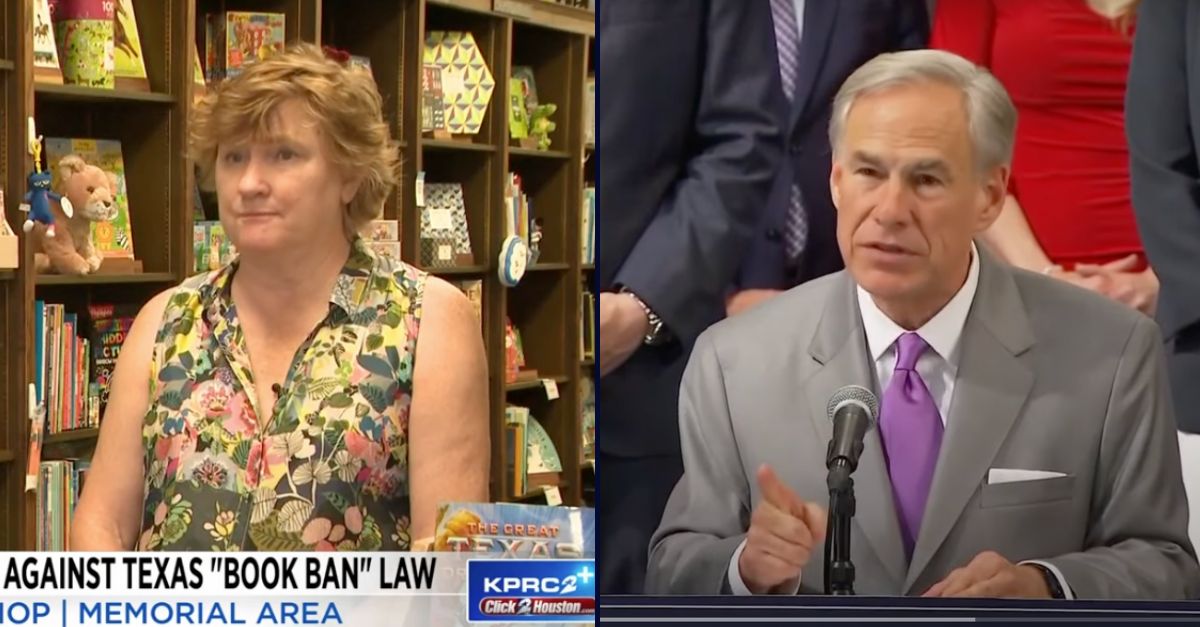
Left: Valerie Koehler, owner of the Blue Willow Bookshop in Houston, Tex., opposes the state’s READER Act (Screengrab via YouTube/KPRC); Right: Texas Gov. Greg Abbott (R) signs the READER Act into law (Screengrab via YouTube/KTBC).
The most conservative federal appeals court in the nation has ruled without comment or explanation that Texas can enforce its new book ban.
In a one-sentence order, the U.S. Court of Appeals for the Fifth Circuit administratively stayed an earlier ruling which would have restricted Texas’ enforcement of H.B. 900, the “Restricting Explicit and Adult-Designated Educational Resources ” or “READER” Act.
H.B. 900 requires school library vendors to rate their books for appropriateness before selling to schools based on the presence of sex depictions or references. Vendors must also rank materials previously sold to schools and issue a recall for those that are deemed sexually explicit. Books rated “sexually explicit” for containing “patently offensive” material would be banned from Texas schools, and those rated “sexually relevant” for containing some representation of sexual conduct would require students to have written parental permission to access them.
The Texas Education Authority (TEA), the commissioner of which is appointed directly by the state’s conservative governor, Republican Greg Abbott, is also empowered by the law to create a “do not buy” list from vendors who do not follow the guidelines.
The law was slated to go into effect on Sept. 1, but U.S. District Judge Alan Albright, a Donald Trump appointee, temporarily blocked its enforcement after a group of bookstores sued the Lone Star State.
Albright found that Texas’ attempt to allow the TEA to have “total, unilateral power to alter any rating with which they disagree” is likely a violation of free speech guarantees under the First Amendment. In a scathing opinion, Albright analyzed the law and found that it likely amounted to not only unconstitutional prior restraint, but that it was also unconstitutionally vague and didn’t protect the right to be protected from compelled speech.
Read Related Also: The Daily Cartoon and Live Briefing: Wednesday, September 29, 2023
Texas appealed, and a three-judge panel of the Trump appointee-heavy Fifth Circuit stayed Albright’s order in its ruling Monday. The panel consisted of U.S. Circuit Judges Jennifer Elrod and Catharina Haynes, both George W. Bush appointees, and U.S. Circuit Judge Dana Douglas, a Joe Biden appointee.
Although the panel’s order itself was silent as to its reasoning, the court’s docket report specified that the stay was issued pending Texas’ filing of its appeal of Albright’s order. Typically, courts will characterize a stay as “administrative” when it is meant to be a brief pause of a lower ruling, and when the decision has been made simply to allow a court additional time. While the Fifth Circuit’s ruling remains in place, Texas is legally entitled to enforce the READER Act.
Recently, conservative states have increasingly looked to legislative book bans to advance various agenda items — with some even putting criminal penalties on the table for the non-compliant. By contrast, other states have adopted statutes that specifically disallow book bans.
Book bans in public libraries, including school libraries, necessarily raise First Amendment issues. While a 1982 Supreme Court ruling found that a public school board’s content-based book ban violated the First Amendment, the decision left the precise legalities largely unclear.
According to the American Library Association, censors targeted a record 2,571 titles in 2022 — a 38% increase over the prior year. Many of the books banned are stories by and about racial minorities and the LGBTQ+ community.
While the READER Act arguably is a form of government-endorsed censorship, the Fifth Circuit has declined to allow private companies to impose its own content restrictions: just last year, a different panel of Fifth Circuit judges ruled that social media companies do not have the right to censor users’ posts.
Have a tip we should know? [email protected]








